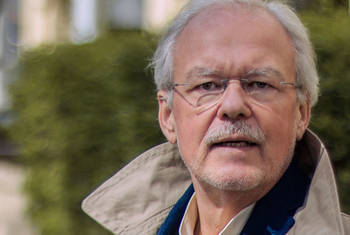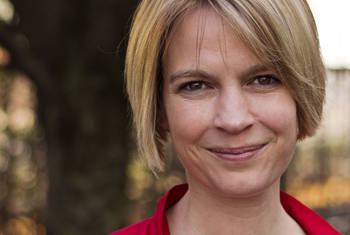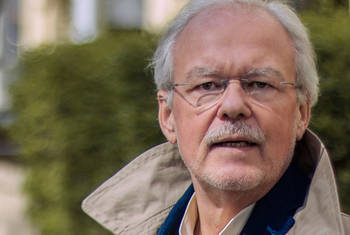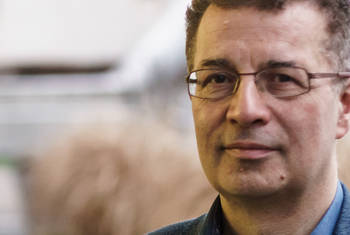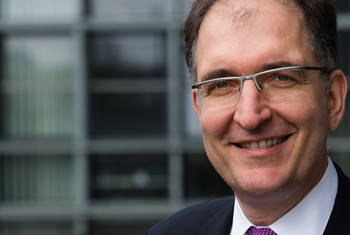Stefan H. E. Kaufmann How Can We Improve the Existing Vaccine for Tuberculosis to Combat the Growing Number of Multi-Resistant Strains?
Stefan H.E. Kaufmann is a Founding Director of the Max Planck Institute for Infection Biology, Berlin, and Professor for Microbiology and Immunology at the Charité University Clinics, Berlin. Kaufmann used to be the president of the German Society for Immunology and is a member of the German National Academy of Sciences Leopoldina. As a leading researcher in the field of immunology, Kaufmann identifies tuberculosis as a continued health threat and explores how to make tuberculosis treatments more affordable and effective in the face of multi-resistant tuberculosis.
Area of Research
Immunology
since 1998
Professor
Humboldt University of Berlin (Humboldt-Universität zu Berlin)
Charité, Medical Faculty
since 1993
1991-1998
Full Professor and Chair
University of Ulm (Universität Ulm)
Department of Immunology
1987-1991
Professor
University of Ulm (Universität Ulm)
Department of Medical Microbiology and Immunology
1982-1987
Staff Scientist
Max Planck Society (more details)
Max Planck Institute of Immunobiology and Epigenetics
1982
University Assistant
Free University of Berlin (Freie Universität Berlin)
Institute for Medical Microbiology
1981-1987
Associate Professor
Free University of Berlin (Freie Universität Berlin)
Institute for Medical Microbiology
1978-1981
Assistant Professor
Free University of Berlin (Freie Universität Berlin)
1976-1978
Scientific Assistant
Ruhr University Bochum (Ruhr-Universität Bochum)
Institute for Medical Microbiology
1981
Habilitation in Microbiology and Immunology
Free University of Berlin (Freie Universität Berlin)
1977
PhD
Johannes Gutenberg University Mainz (Johannes Gutenberg-Universität Mainz)
1973
Diploma in Biology
Johannes Gutenberg University Mainz (Johannes Gutenberg-Universität Mainz)
- American Academy of Microbiology
- American Society for Microbiology
- Berlin–Brandenburg Academy of Sciences and Humanities
- European Academy of Sciences
- European Molecular Biology Organization
- European Network of Immunology Institutes
- German National Academy of Sciences Leopoldina
- German Society for Hygiene and Microbiology
- German Society for Immunology
- International Academy of Sciences of Nature and Society
- Medical Society of Berlin
- Microbiology Society of Berlin
- New York Academy of Sciences
- Society for Mucosal Immunology
Prizes
- The University of Amsterdam Spinoza Leerstoel Medicine Award (2014)
- Gardner Middlebrook Award (2014)
- Honorate Doctor Université de la Mediterranée, Marseille (2007)
- Honorary Medal of the Robert Koch Institute (2005)
- Eijkman Medal, University of Utrecht (2004)
- Dr. Friedrich Sasse Prize (2003)
- Main Prize of the German Society for Hygiene and Microbiology (1993)
- Pettenkofer-Prize (1992)
- Dr. Robert Pfleger-Prize (1992)
- Merckle Research Prize (1991)
- Smith Kline Beecham Prize (1991)
- Aronson Prize Berlin (1988)
- Alfried Krupp Award for young professors (1987)
- Research Prize of the German Society for Hygiene and Microbiology (1983)
- Dr. Friedrich Sasse Prize (1981)
Fellowships
- Royal College of Physicians of Edinburgh (2014)
- Innovative Medicines Initiative JU Integrated Project "PreDict‐TB" (IMI 115337) (since 2012)
- Innovative Medicines Initiative JU Integrated Project "BioVacSafe" (IMI 115308) (since 2012)
- EDCTP Network "TB‐TEA" (MS.2010.18000,002), Project Coordinator (since 2011)
- EU Large‐Scale Integrating Project "ADITEC" (HEALTH‐F4‐2011‐280873) (since 2011)
- Federal Ministry of Education and Research (BMBF) German‐South African Collaboration “Cell specific biomarkers of TB”, SUA 10 038 (since 2011)
- EU Large‐Scale Integrating Project "NEWTBVAC" (HEALTH‐F3‐2009‐241745), Chair of the Scientific Steering Group (since 2010)
- EU Large‐Scale Integrating Project "SysteMTb" (HEALTH‐F4‐2010‐241587) (since 2010)
- BMBF German‐Indian Collaboration “Studies on early and late signalling events in the pathogenesis of TB”, IND 10‐028 (since 2010)
- EU "I3" Project "TRANSVAC" (FP7‐INFRASTRUCTURES‐2008‐1‐228403) (since 2009)
- EDCTP Integrated Project "AE‐TBC" (IP‐09‐32040‐011) (since 2010)
- EU CSA PRD – “Poverty Related Diseases College” (HEALTH‐F3‐2009‐223581) (since 2009)
- NIH/NIAID Grant “A Systems Biology Approach to Infectious Disease Research” (NIH # HHSN27220080059C), Subaward 22520720‐41466‐B (since 2008)
- EU Collaborative Project “PHAGOSYS ‐ Systems Biology of Phagosome Formation and Maturation, Modulation by Intracellular Pathogens” (HEALTH‐F4‐2008‐223451) (since 2008)
- BMBF Competence Network “Pulmonary Tuberculosis – Host and Pathogen Determinants of Resistance and Disease Progression” (since 2007)
 © Maximilian Dörrbecker
© Maximilian Dörrbecker
Max Planck Society
"The Max Planck Society is Germany's most successful research organization. Since its establishment in 1948, no fewer than 18 Nobel laureates have emerged from the ranks of its scientists, putting it on a par with the best and most prestigious research institutions worldwide. The more than 15,000 publications each year in internationally renowned scientific journals are proof of the outstanding research work conducted at Max Planck Institutes – and many of those articles are among the most-cited publications in the relevant field." (Source)
Institute
Max Planck Institute for Infection Biology
"The Max Planck Institute for Infection Biology was founded in 1993. The Institute commenced its operation in a provisional laboratory facility and a small group of scientists that has greatly expanded over the years, and relocated to an especially built facility in summer 2000."
"Infectious diseases continue to be the number one cause of death world-wide. Nearly one third of the cases of death caused by infectious diseases are attributable to "the big three", namely AIDS, malaria and tuberculosis.
In addition, new infectious diseases are arising and proving themselves to have major effects on society, such as Helicobacter pylori, the etiologic agent of infectious gastritis, or Chlamydia, the causative agents of various infections. Efficacious vaccines against most infectious agents are not available up to date, at the same time, the potential of available vaccines has been exhausted. The development and widespread use of antibiotics and other medications have contributed to the rise and spread of resistant strains.
Multidisciplinary research into the molecular and cellular mechanisms of infection is not only basic science, but also applied research essential for the development of novel preventative and therapeutic measures against infections, directly affecting the health and social problems of the present and future.
The Institute employs multi-disciplinary approaches to infection biology, comprising concepts and methodologies of molecular genetics, immunology, cell biology, epidemiology, clinical research and protein chemistry. The Institute promotes the applications of its research towards paving the way for the design of rational measures of control of infectious diseases." (Source)
Map
Each year 1.5 million people die of tuberculosis thus making it the number one killer of all contagious diseases. With the number of multi-resistant tuberculosis growing, currently available treatments are no longer as effective as they used to be. The existing vaccine does not protect against pulmonary tuberculosis which is the most common form of the disease and easily transmittable. In this video, STEFAN H. E. KAUFMANN describes how this existing vaccine was modified to trigger an additional component of the cellular immune response. The researchers showed that it achieved profound reduction of bacterial load in the lung and an excellent safety profile in preclinical studies. The vaccine candidate is currently undergoing clinical trials to be approved for humans.
LT Video Publication DOI: https://doi.org/10.21036/LTPUB10207
Increased Vaccine Efficacy Against Tuberculosis of Recombinant Mycobacterium Bovis Bacille Calmette-Guerin Mutants that Secrete Listeriolysin
- Leander Grode, Peter Seiler, Sven Baumann, Jürgen Hess, Volker Brinkmann, Ali Nasser Eddine, Peggy Mann, Christian Goosmann, Silke Bandermann, Debbie Smith, Gregory J. Bancroft, Jean-Marc Reyrat, Dick van Soolingen et al
- The Journal of Clinical Investigation
- Published in 2005


